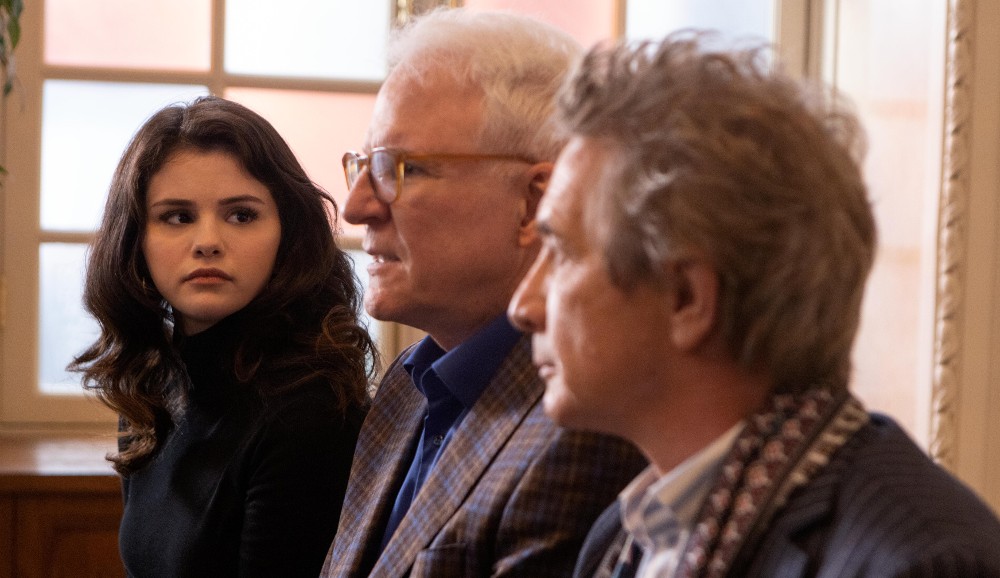
Musician, songwriter, and composer Siddhartha Khosla earned his fourth Emmy nomination for his work on NBC’s acclaimed drama This Is Us this past year, and he also picked up two additional Emmy nominations for his main theme and score for Hulu’s Only Murders in the Building.
If you’ve watched either show, then you’re abundantly aware of Khosla’s contributions, particularly the songs he co-wrote with Taylor Goldsmith from the band Dawes for This Is Us. Khosla and Goldsmith’s latest Emmy-nominated song is “The Forever Now,” sung by Mandy Moore in a particularly moving moment during the “Day of the Wedding” episode from the show’s sixth and final season.
The way that the first two seasons of Only Murders have been received, there’s a good chance that Khosla’s distinctive score and title theme music will keep him in the Emmy conversation as long as that show remains on Hulu. The episode he submitted for Emmy consideration this year, “The Boy From 6B,” is a particularly powerful episode that focuses on a deaf character who speaks through ASL, and there’s no spoken dialogue in the episode, so the score is even more important than usual.
Shortly after this year’s Emmy nominations were announced, Below the Line hopped on Zoom with Khosla for the following conversation, in which he discussed all aspects of his music and his work as a composer.
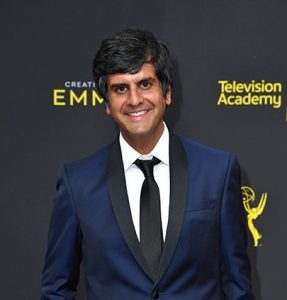
Below the Line: Congratulations on your three Emmy nominations. You’ve tripled your odds to win this year! Impressive…
Siddhartha Khosla: I have no idea about any of that stuff. I am currently an Emmy-losing composer, and I have a very good chance of continuing to be that after September. [laughs]
BTL: To begin, when I speak with composers, I’m always curious about how they got their start, so what’s your origin story, so to speak?
Khosla: My parents came here from India to the U.S. in the late ’70s, and I was born. They were new immigrants in this country and came here with virtually nothing, so they ended up sending me back home to India to be raised by my grandparents for the first couple years of my life.
At a very formative stage, I was just immersed in Indian culture and music. I grew up listening to old Hindi music that my grandparents loved and that my parents love, like Bollywood music from the 1960s and ’70s. Bollywood is like Hollywood, the Indian film industry, but all the music and the songs came from film. It wasn’t like here where you have bands that break, and they’re on the radio, and then you discover them that way. Most of the discovery of music in India happened and still does happen through film. It’s an important medium. I grew up listening to that stuff.
I happen to be able to sing — I have a voice — so that became my main instrument. My mom recognized I had the ability to sing at a young age, so I would just sing. When I came to the U.S., I would be that kid singing in temple on Sundays for all the Indian aunties and uncles, as we call them. That just became my education in learning old Hindi music. Eventually, I was a singer in my high school band, and then that evolved into being in an a capella group in college. After college, I started a band, and we were signed to Mercury — the band was called Gold Spot. My education came via singing, really, and songwriting, so I was the singer-songwriter of my band, and then that eventually brought me to scoring film and television.
BTL: You’ve been scoring This Is Us for a while now, and you’ve co-written a couple of songs that have been nominated for Emmys, so how did you first get involved with the show, and then more specifically, with writing songs?
Khosla: I think it’s just that my background in music, first and foremost, was that my education came by being in bands. I was a songwriter before a composer for screen. The people that I work with, like [This Is Us creator] Dan Fogelman, who I’m sure you’ve heard of — he’s an accomplished screenwriter in Hollywood. He and I had been friends since college. We met at the University of Pennsylvania, my freshman year, we were hallmates, and then we became roommates. We both moved out to Los Angeles around the same time in the late ’90s — boy, this really dates me.
Dan and I were fans of each other in our respective careers, and also really good friends, but those paths never converged. I don’t know if we made an effort to not work together, but we certainly didn’t work together. There were a couple of moments where he was like, ‘Oh, I’m doing this TV show. Can you write my theme song?’ I would help him do something like that, but it was never of interest to me, frankly, at that time. I was just more interested in being in a band and touring. That was what my dream was.
Eventually, sort of, like, deep into my record career, Dan called me and asked me to compose the music for his TV show called The Neighbors on ABC. They were looking for a composer going into their second season, and he called me to do it. At this point, I had just come back from touring my last record. Doing film and television was not really on my radar. I had been writing stuff for commercials, like, I did a Target ad for their winter campaign or something.
BTL: There’s lots of money in that.
Khosla: I guess you can say that, but if you average the amount of money you get over the years of trying to get it, it doesn’t average out to much. The single payout is great, but then you put it over three years of trying to land one of those things, [and] it’s not so much money at the end of the day. Dan asked me to come in and to be honest, I didn’t think I could do it. I was quite reluctant, initially; I did turn down the offer, originally. I actually recommended somebody else for the gig, and then Dan was like, ‘No, I want you to do it. I think you can do it. You have the ability,’ because he’s a fan of my band. He had seen it all. A part of me knew I could probably do this type of thing, but it was something very new to me in terms of the process and all of it that I was just like, ‘I don’t think I can really do this.’ So, he said, ‘Well, think about it,’ and after having conversations with my wife and manager and other people, they were like, ‘Yeah, take it, try it. See what it does.’ It was the best decision I made, to take that gig.
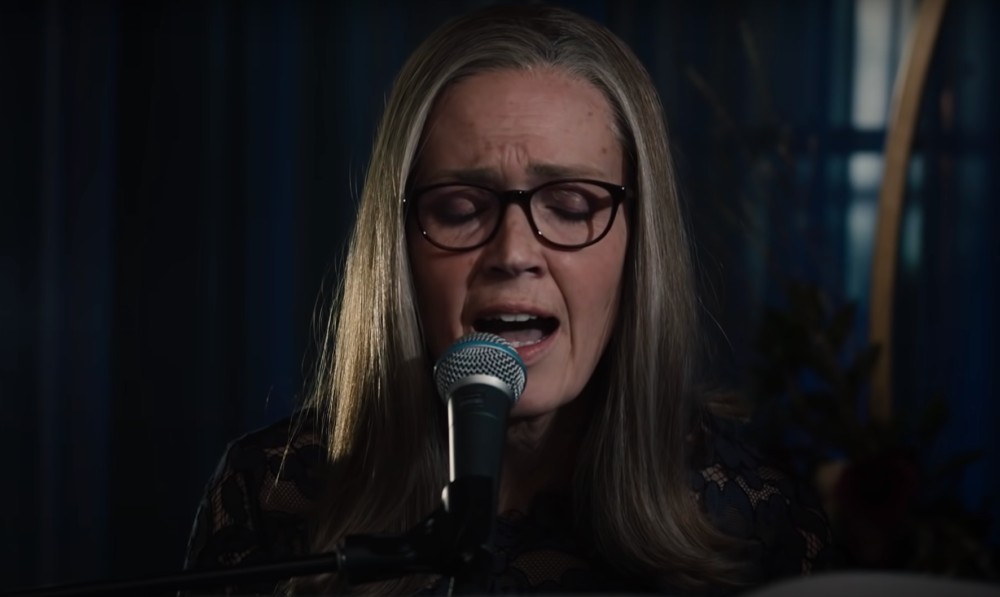
BTL: I have to assume that writing a song for a show is a different process since you have to incorporate aspects of the character and what they’ve been through into the songs. By the sixth season of This Is Us, those characters must have gone through a lot.
Khosla: When Dan hired me and This Is Us finally came around, Dan, knowing my skill set of being able to write songs as well as score at that point, knew he had that in his back pocket on this show, as well. I think I’ve had four original songs on the show over the six years, in four really big moments, and we’ve had success, as you mentioned.
Writing for something on screen is obviously very different, because you need to get into the character’s head, and it’s sometimes, like, Mandy Moore on the show — Rebecca, the character she plays, is a singer [who] never made it. That’s the other backstory of her. She tried to make it back in the ’60s or ’70s, she wanted to be like a Joni Mitchell-type of singer and never sort of got there. And now, in old age, she has Alzheimer’s, and she has to sing the song that she has written with her daughter for her daughter’s wedding. That’s what was incredibly heartbreaking, because she gets up on the keyboard to play, and it looks like she’s not gonna know where she is or what she’s doing. And she doesn’t for a moment, but as people with Alzheimer’s are able to do, she’s able to tap into her mental musical memory and perform it, almost flawlessly. She’s also an older woman performing it, so in terms of composing that song, we had to take a very immersive, to the point that, like…
So I collaborate a lot on original songs with Taylor Goldsmith, who is nominated alongside me for the song. Taylor is the lead singer-songwriter of a band called Dawes. They are one of my favorite bands, and he’s a great lyricist, who also happens to be married to Mandy Moore. Originally, I brought Taylor on. There was a dual purpose — one was, I’m a huge fan of his, and I loved his lyrics. I thought he was a great songwriter, and I knew he and I could write something really special together. I also knew that he had a window into Mandy. You live with her, you’re married to her, you have a child together, so he had an interesting perspective into her character, more than anyone. And so, we were able to tap into that resource, which is very meta. The whole show is a very meta experience for me.
BTL: I guess there’s a lot of time travel or jumping to different periods in the show, as well?
Khosla: It was about this larger connectivity of life. It’s this idea that we make these seemingly small or benign choices in our life, and they end up having this domino effect through the history of our family, either preceding us, who led us to be there in the first place, but then also, in [who] follows us. There’s a trail that we leave behind. The show jumps around in time. So you do see Mandy Moore in her 30s, you do see her playing a 20-something-year-old, and you see her being very old on her deathbed. You see the entire gamut of this family’s life, so that was an incredibly powerful moment because when you watch that scene, she’s performing this song for the whole family, and the family knows that she suffers from Alzheimer’s, and the reactions of the characters watching her — they’re crying and losing it. It was really powerful because you could see this entire family on one level, just proud of their mom for being able to pull this off, and on the other level, sad for where she is physically [with] her health.
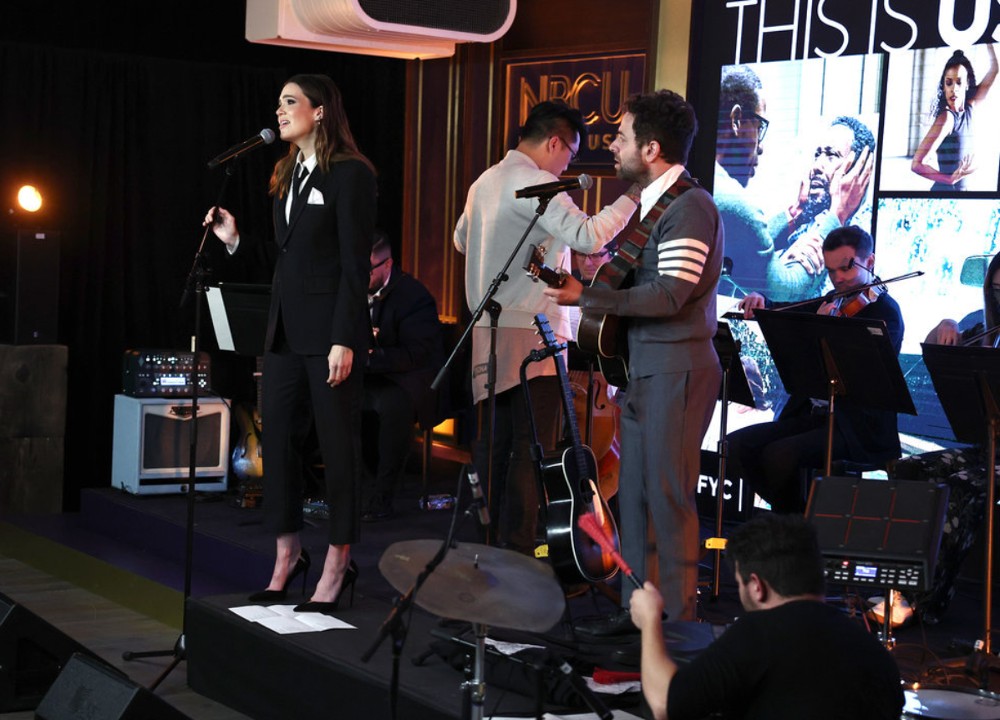
BTL: I’ve only really known Dawes for maybe a week since they have a new album out and they played on a morning show I watch.
Khosla: We have written a bunch of songs together, and this was very special, the final season of This Is Us. Now, we’re done, and we ended up writing the song together that got so much love, too. It ended up being number one on the U.S. song charts after the episode aired, which also goes to show you the power of TV. People watching it drives people to get it.
BTL: Okay, let’s get into Only Murders in the Building. Obviously, after scoring an award-winning show like This Is Us, you’re going to get called for other things, so who was the person who reached out to you to compose for Only Murders in the Building?
Khosla: A perfect example of the value of having these long-term relationships with producers is that Fogelman introduced me to John Hoffman, who co-created the show with Steve Martin. Dan, who is one of the producers of Only Murders, introduced me to John, and John and I had a Zoom meeting. At the time, this was early in the pandemic, I had started writing my own instrumental, modern classical record.
You come off a show like This Is Us [and] people think you’re maybe capable of doing a very specific thing, which is scoring emotional drama, which is what This Is Us is. Obviously, the score for This Is Us also had gotten me some awards accolades and love, and it was really cool that the Television Academy recognized my score for that show a couple times, but it’s a very specific thing. It’s an emotional drama, and so, people are quick to think that’s all you can do.
Composers like Philip Glass are a huge influence, or French composers like Erik Satie, for example. In my mind, I said, ‘Well, let me just try to write my own modern classical record.’ All productions had sort of stopped at that point, because of the pandemic, and I was like, ‘This is a good time to practice and just write.’ And so, I started writing, and I got the script for Only Murders, and it was such a magical script [that] I wrote a note back to Dan Fogelman. “Only Murders is magic” was all I wrote, and he forwarded that to John, and John said, ‘I want to meet Sidd,’ and so we met, and I played John some of these pieces I’d been writing, and he’s like, ‘This is actually the kind of vibe I’m going for.’ And then, I’d written something off the script, and I played it for him, and one of those pieces I played for him ended up becoming the main theme.
BTL: I’m assuming it’s intentional that the main theme feels like one of those podcasts like Serial, which is similar to what the characters on the show are making?
Khosla: I’ve been asked that before, and in terms of, like, my direct influence for that, [starts singing] with the quarter note pulsing piano, it’s a very ‘60s thing, and it’s a very Beach Boys thing. [starts singing the opening chords of “Wouldn’t It Be Nice”] That is a very Donovan and Beach Boys 1960s sound.
My biggest influences as an artist are George Harrison, [Paul] McCartney, the Beatles, Brian Wilson, and Donovan, so that piece of music, actually, in my head, as I was writing that melody, was almost a joke for me playing it for John. John’s like, ‘What is that?’ I was like, ‘I don’t know. It’s just some noodle thing that I’m hearing.’ And he was like, ‘Whatever that is, finish that because that, right there, is my theme.’
I didn’t think that was going to become the theme of the show, and then it turns out that yeah, even in that sort of podcast-type of music, there’s a buoyancy to it, but it’s also mysterious at the same time. It teeters [on] this very strange, tough line. It’s not too mysterious, it’s not funny, but it kind of has this wink in it. It’s also reflective of my personality, in terms of the way I like to write — I am equal parts dramatic as I am comedic, I think, in my personality, and that’s reflected in that piece.
For me, the influence is that ’60s rock-‘n-roll thing, but then that melody was just an earworm for John, and me, too. John was like, ‘It makes me feel equal parts dramatic, as it does comedic, as it does mysterious. It also makes me feel lonely. It’s all these emotions that I want to get across in this show in that one chord progression piece of music.’
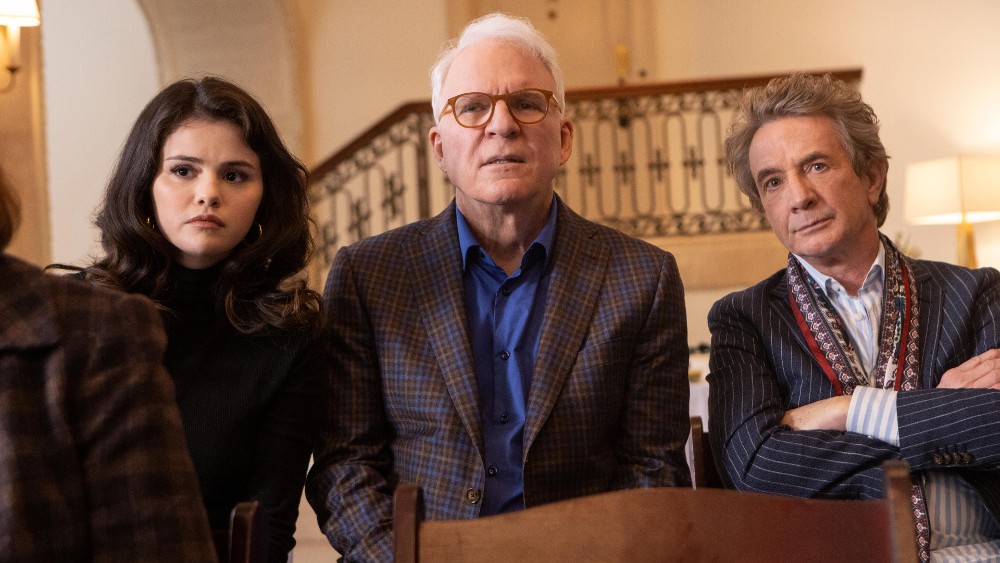
BTL: Do you usually work directly with John when you’re coming up with themes and cues and spotting the episodes?
Khosla: Yeah, John’s the one I work with directly. He’s such a creative soul, and that’s another thing, too. We’re in this day and age of television that’s really elevated — there’s so much great stuff. I mean, honestly, to be nominated this year for the show, along with some of these other people, is an honor, because I see the other work that’s out there, and there’s just great work.
Teddy [Shapiro] does great work on Severance, and Nicholas [Britell] on Succession, and Cristobal [Tapia de Veer] and White Lotus, they’re all just wonderful, wonderful original scores. I feel [the same way about] Natalie [Holt and her work on] Loki. All these people do this great work, and it’s because [of] people like John Hoffman, people like Dan Fogelman, [and] these working creators that want you to also be creative.
John has no rules. It’s like, ‘Just be as weird as you want to be, because at the end of the day, we’re all a little weird, and that’s what makes us unique. We all have our little quirks.’ It’s been really empowering working on this show because of John, because he’s just like, ‘Try everything.’ And that’s what was key on the main title. When I first turned in that piece of music, John was like, ‘I love this. This is my theme.’ Dan Fogelman called me and said, ‘How do you make this tough?’ Another producer said, ‘How do you make it more New York?’ I took all these notes in my head, and it was actually my assistant [who] suggested, ‘Why don’t we get Home Depot buckets on the main title?’ I was like, ‘That’s genius.’ We were just having a conversation about New York, and talking about the socio-economic diversity of the city.
Even in the Arconia, in that one building where the show takes place, you have a mix of incredible amounts of wealth, and also, I wouldn’t necessarily say poverty, but much poorer people who are there, who are grandfathered into probably $400 or $500 a month rent. You have this mix, and so, taking those notes of toughening up that theme, and then also this idea of how do we make it more New York, we came across this idea of having the idea of like a street musician in the subway playing along to the score.
My drummer, James McAllister, plays with The National and Sufjan Stevens, this artist that I love. James is super-creative; he went out and bought a bunch of paint buckets from Home Depot and set them up as a drum kit, and mic’d them up and recorded that [sings a drum rhythm]. That’s a street musician playing buckets on the main title, and that rounded out the piece, ultimately, and it was just like, ‘Okay, now it’s tough. Now it feels New York,’ and then you mix that with a 40-piece orchestra, and there are these big, majestic sounds in the main title that represent the inner walls of the Arconia, to me.
BTL: You’re in an interesting situation with Only Murders because you have recording artists like Steve Martin and Selena Gomez, who are not only the show’s stars but also among its producers, so do they ever get involved or throw out ideas for music?
Khosla: In the first season, one of my most favorite things I have that I’ll always cherish is our director for the pilot, Jamie Babbit — incredible director. She suggested, at one point, having Steve, Marty, and Selena on the main title theme, singing the melody along with whatever instruments I had. Have them hum it or whatever, so they took a break on set one day, and I had sent in a demo of me playing it on the piano to teach them how to sing it. Marty and Steve are sort of walking each other through the notes, and at the same time, it’s obviously comedy hour. You can hear them making fun of me.
Marty’s making fun of me as I’m playing the piano because I did this thing where I was like, ‘Okay, guys, here we go’ and then I started playing it, and so every time you’d hear them replaying my clip, and then Marty would impersonate me, and be like, ‘Okay, here we go,’ and they were laughing through it, and Marty and Steve and Selena, you could hear them just practicing it and learning it and correcting each other, and Marty’s singing it one way and Steve’s saying, ‘No, he’s going up to that, not down.’ It was really cool, and they recorded it, and so I have that audio recording.
BTL: They didn’t film it while they were recording it, though?
Khosla: Maybe they did film it, because somehow, I got audio, maybe from someone’s phone. I don’t know how I have it, but it’s really one of the most special things that I have. They ended up not being on the main title, ultimately — it wasn’t the right sound. So they came close to doing something with me on it, but I have that very magical moment. There’s a moment at the end of the pilot where Selena hums the main theme in the shower, very meta. Why would she be singing that theme? But that’s part of the magic of the show is that we tap into this magical realism oftentimes in the show — stuff doesn’t always have to be so linear.
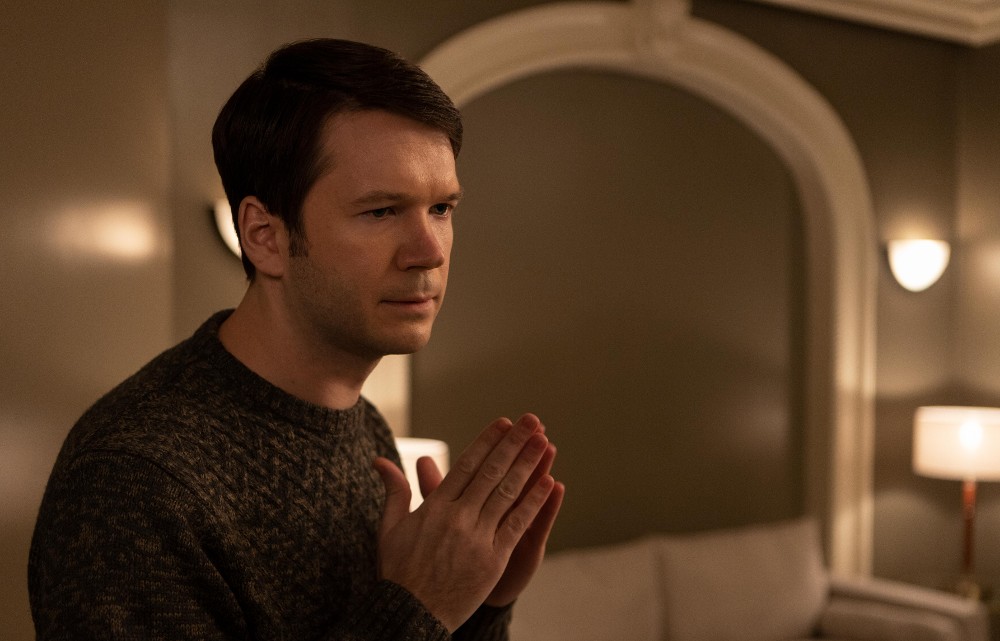
BTL: I didn’t realize that the Emmys for composing tend to be for specific episodes rather than for an entire season, and the one you were nominated for was the one in which most of the dialogue was ASL, so how did you approach scoring that episode?
Khosla: The episode that I submitted was “The Boy From 6B,” and it was our quote-unquote “silent episode.” There is no dialogue in that episode, except for one line that Steve says at the very end. It’s all told from the perspective of Theo Dimas, Teddy Dimas’s son, who happens to be deaf. Their communication is in ASL the entire episode, and with it, a gorgeous job of sound design from Matt Waters and our sound design team, creating the sound design of what it sounds like from the perspective of somebody who is communicating via ASL. It’s all this inaudible sort of rumble.
The only other thing that we had in the episode was score — music to drive the narrative. It was a very challenging episode because now the music was on display, and you could hear every note, every nuance of it. I was very, very particular about how everything sounded, more so than ever. There’s a lot of thematic material in that episode that’s woven throughout and that helps drive the story. It was a great challenge for me, because normally, I’m scoring a scene and the dialogue is sort of the lead singer, if you will, and I’m the band around the dialogue. In this case, that wasn’t there, and so my lead melodies served as the lyricism of the episode, the lyrics of it in a way.
Our orchestra did a stunning job on it. Our editor on that episode, Julie Monroe, did such a great job — it was just a great collaboration. At one point, the thought was [that] we’d have it entirely silent, like no music. Even the main title was all going to be silent, but I think when we saw the initial cut, we felt we could do that, but why not lean into the score more and use it to tell the story like a silent movie might?
BTL: Do you do some of your own production or engineering on the music you record?
Khosla: I write everything and then I will play it on piano, and then oftentimes I will play stuff on my Beatles-era Mellotron, this mock-up stuff, and then our orchestrator will orchestrate with me the parts that I’ve written for orchestra. But it’s a team effort. On This Is Us, I played every single note of that score and created every sound of that myself with the exception of a cello. But on Only Murders, we have a whole ensemble that plays, and so they all bring their magic. We have some of the best string players and woodwind players around, so we’re very fortunate that we have the ability to utilize the gifts of all these musicians to help shape that sound.
BTL: I’m glad you mentioned This Is Us, specifically. I was listening to the score from the recent season, and I just love the amount of reverb and the space you created.
Khosla: Thank you. Yeah, there’s a lot of reverb. There are reverbs into reverbs on that show. I created a chain. My main pad sound on that was a compressor going into a reverb going into a compressor, back into another reverb, going into a compressor, into another reverb. It was so useless. I probably didn’t even need to do that, but I like randomly doing that stuff, and it’s like, ‘Okay, no one’s gonna be stupid enough to do what I just did, so this feels original.’ Engineering is a big part of it. I also engineer a lot of my own stuff. Obviously, when we do the orchestra, I’m not engineering that, but my assistant is a great mixer as well, so he mixes everything [and] stuff sounds really good because of him, too.
Both seasons of Only Murders in the Building are now streaming on Hulu, as are all six seasons of This Is Us.





